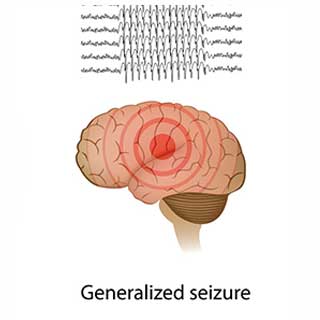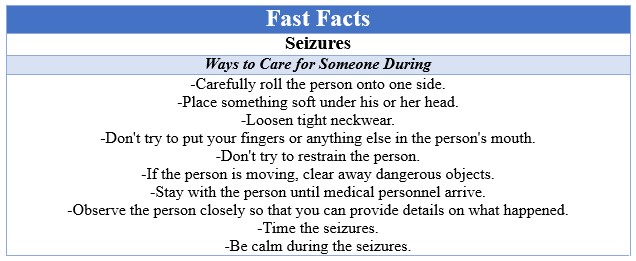What is going on inside your head?
You are sitting at your dining room table eating dinner when the next thing you know, you wake up on the floor with the taste of blood in your mouth and your pants are wet. Your family is around you asking if you are ok. When you ask them what happened, they say that you slumped over and your whole body was shaking. What does this mean? Most likely, you’ve had a seizure. Why did you have one and what does it mean?
 Definition
Definition
A seizure is caused by abnormal electrical activity in your brain. It happens suddenly and can vary in duration and severity. There are two main types with multiple sub-types. The first main type is generalized and this means that the seizure involves both sides of the brain from the start of the attack. The second type is partial (focal) and occur in a specific area of the brain and may remain contained there or spread to the entire brain. In generalized there are six sub-types that include tonic (stiffening of your muscles, especially back, arms, legs, causing you to fall to the ground), clonic (repetitive or rhythmic jerking of muscles, usually face, neck, arms), tonic-clonic (body stiffening and shaking, loss of bladder control, biting your tongue), atonic (loss of muscle tone/control causing you to collapse, referred to as drop seizures), myoclonic (sudden, brief jerks or twitches of arms or legs) and absence (staring into space, eye blinking, lip smacking—usually occurs in clusters). In partial (focal), there are two sub-types including simple (you remain conscious with some form of alteration in your emotions, a change in the way things look, smell, feel, taste, or sound, involuntary jerking of a body part—usually arm or leg, and spontaneous sensory symptoms, like tingling, dizziness, flashing lights) or complex (your level of consciousness/awareness changes, start into space and do not respond normally to your surroundings and perform repetitive movements, such as hand rubbing, chewing, swallowing, walking in circles). A special type that occurs under generalized is febrile seizures and mainly presents in children when they have a high temperature. It is the body’s natural way to try to lower body temperature. The child should still be evaluated by a doctor if this occurs. If you have frequent (recurrent) seizures, this is known as Epilepsy.
Treatment
In order to treat a seizure, you need to know what causes it. Unfortunately, the cause of seizures is largely unknown. There are some conditions that can induce a seizure and in these cases, it is important to treat the underlying condition. This will help treat the possibility of having a seizure. Some examples of conditions are stroke, brain tumors, head injuries, electrolyte imbalance, very low blood sugar, repetitive sounds or flashing lights (like a video game), medications (antipsychotics and some asthma drugs), withdrawal from medications (Xanax, narcotics, alcohol), use of drugs (cocaine/heroin), cancer, brain infections (meningitis), developmental disorders (autism and neurofibromatosis) and genetics. To properly treat your seizures, your doctor will perform some of the following: neurological exams, blood tests, electroencephalogram (EEG), CT/MRI/PET (Positron Emission Tomography) scan of your brain and neuropsychological tests. By locating where the seizures are originating, it can help determine the best treatment options. Options include medications, surgery or therapies, such as a Vagus nerve stimulator. If you have a seizure, you should see a doctor if it is your first seizure, the seizure last longer than five minutes (condition known as Status Epilepticus), breathing/consciousness doesn’t return after seizure stops, a second seizure follows immediately, you have a high fever, you’re experiencing heat exhaustion, you’re pregnant, you’re a diabetic, or you were injured during the seizure.
Prevention
Although it isn’t possible to prevent seizures, it is possible to be prepared and this will provide you with a sense of control. The main things to remember are to take your medication as prescribed (always talk to your doctor before changing anything), getting adequate sleep (not getting enough can trigger seizures), exercise regularly, manage stress, limit alcohol intake, and don’t smoke. Be sure to wear a medical alert bracelet, this will let emergency personnel know how to treat you. Having uncontrolled seizures can make you feel overwhelmed and cause depression. The best way to combat this is to live as independently as possible and educating yourself and loved ones so that everyone has an accurate understanding of your condition. This can include giving instructions to those you’ll be around on the best ways to handle a seizure. Please see Fast Facts for more information.
Having a seizure can be a scary process to go through, but with some understanding you can lead a normal, healthy life. If you have any questions, please speak to your doctor. If you would like any further information, please visit the Epilepsy Foundation at http://www.epilepsy.com/